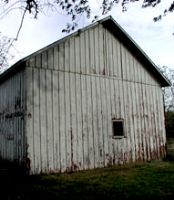LOOKING FOR A PREVIOUS STORY? CHECK THE ARCHIVE.
Omega Buys Soon-to-Close Tenn. Plant,
Plans to Add 450 More Workers
Plans to Add 450 More Workers
by JACK LYNE, Site Selection Executive Editor of Interactive Publishing
|
CLINTON, Tenn. – It was a deal that came together just around Christmastime. And it was one that carried a certain sort of seasonal ring.
The company, you see, was born in a manger . . .
Well, OK, it was actually an Iowa barn in which Omega Cabinetry first sprang to corporate life 26 years ago. But the Waterloo, Iowa-based company did follow its own distant star, deciding to move into a plant in Clinton, Tenn., that was only two months away from shutting down.
"We wanted to complement our Waterloo campus, get closer to our East Coast customers, and take advantage of the work force that's available here," Omega President John Celoni said in announcing the Tennessee project. "We've had some tremendous growth."
So tremendous, in fact, that the new company that's coming to town will not only rehire most of the 150 workers who would've lost their jobs in early 2004, when HomeCrest Cabinetry closed its Clinton plant. Omega will also appreciably expand the facility and plans to add another 450 jobs over a five-year span.
Different, it'll be. Omega is buying HomeCrest's 200,000-sq.-ft. (18,000-sq.-m.) facility and retrofitting it to its needs. What's more, the company is adding another 100,000 sq. ft. (9,000 sq. m.) of space to accommodate a 600-employee operation.
Omega and HomeCrest share similarities beyond being in the same industry. They're both also under the same corporate umbrella - a fact that ultimately figured big in making the deal happen. Both are divisions of Jasper, Ind.-based MasterBrand Cabinets, a subsidiary of Fortune Brands Inc.
But Omega and HomeCrest are headed in very different directions vis-à-vis Tennessee. HomeCrest's management in April of 2003 decided that the company wasn't going to make cabinet doors and frames anymore in Clinton, part of the Knoxville metro. Instead, it's moving the Tennessee plant's work to Goshen, Ind., where HomeCrest has an existing cabinetry operation.
News of the impending shutdown left state and local officials facing a 2003 Christmas season that, for some Clinton-area residents, would be Scrooge-like, with abundant anxiety and looming loss. The HomeCrest plant was set to close on Jan. 31st, laying off all of its 150 current employees.
"This was basically going to be a dead facility," Andersen County Mayor Rex Lynch said at Omega's project announcement.
One ripe recruiting ground was the wide array of companies that are part of Lincolnshire, Ill.-headquartered Fortune Brands. The Fortune 500 firm's broad interests range from distilled spirits (e.g., Jim Beam, DeKuyper) to golf equipment (e.g., Titleist, Cobra) to home and office products (e.g., Moen, Master Lock, Day-Timers and Swingline).
Cabinetry, though, got the biggest recruiting push. The Clinton facility could be a natural fit for another cabinet-making concern. And Omega was a potential natural as an occupant. The company was experiencing bullish growth, enjoying a mortgage refinancing run driven by record-low interest rates.
But the company had heretofore limited expansion to Iowa. It had expanded a lot, though, in the Hawkeye State. Omega five different times had added new space at the Waterloo location that it moved into in the mid-1980s. The site now spans some 400,000 sq. ft. (36,000 sq. m.) and employs 1,250 workers.
As fate would have it, Omega happened to be looking to make its maiden expansion voyage outside of Iowa (which won't affect its Iowa jobs). And it wanted a non-union Southeast site that would provide stronger access to its eastern U.S. customers. The company was already considering a number of sites in the region.
One problem was the sewer system, which was sorely in need of major reworking, local officials readily conceded. Better truck access for the larger facility was another major to-do item.
In addition, worker training was an Omega priority. True, it had a cabinetry-savvy labor pool on hand in HomeCrest's 150 workers. But Omega would be a substantially different operation. Where HomeCrest has only made doors and frames, Omega would make, assemble and ship entire cabinets.
The Iowa-based company recently began running help-wanted ads in a Clinton newspaper. But it still hadn't committed to the project, waiting to see what incentives would shake out.
What the state and Anderson County offered was a $3-million package - one that put Omega's concerns to rest. The incentives include:
• A two-mile (3.2-kilometer) sewer-line extension that will replace the facility's existing sand-filtration treatment system.
• A new access road, enabling truck traffic to avoid crossing the employee parking lot.
• Five years of state-funded employee training.
By late February, said Celoni, the Clinton plant will be making 100 cabinets a day, ramping up production to 300 units by the end of 2004. That, in turn, ensures that some HomeCrest workers won't be out of work very long.
The job-eating Grinch had tried but failed. He couldn't, in the end, steal Christmas from Clinton.
"Today's announcement," Kisber said when the deal was sealed, "is a prime example of the enormous positive impact of the work of the Governor's Jobs Cabinet and of what can happen when the private sector and public agencies work together toward a common goal of job growth and community development."
The company, you see, was born in a manger . . .
Well, OK, it was actually an Iowa barn in which Omega Cabinetry first sprang to corporate life 26 years ago. But the Waterloo, Iowa-based company did follow its own distant star, deciding to move into a plant in Clinton, Tenn., that was only two months away from shutting down.
|
"We wanted to complement our Waterloo campus, get closer to our East Coast customers, and take advantage of the work force that's available here," Omega President John Celoni said in announcing the Tennessee project. "We've had some tremendous growth."
So tremendous, in fact, that the new company that's coming to town will not only rehire most of the 150 workers who would've lost their jobs in early 2004, when HomeCrest Cabinetry closed its Clinton plant. Omega will also appreciably expand the facility and plans to add another 450 jobs over a five-year span.
HomeCrest Set to Close Jan. 31st
"This plant will definitely be different in six months," Celoni told a Clinton crowd made up of more than a hundred HomeCrest workers and state and local officials.
Different, it'll be. Omega is buying HomeCrest's 200,000-sq.-ft. (18,000-sq.-m.) facility and retrofitting it to its needs. What's more, the company is adding another 100,000 sq. ft. (9,000 sq. m.) of space to accommodate a 600-employee operation.
Omega and HomeCrest share similarities beyond being in the same industry. They're both also under the same corporate umbrella - a fact that ultimately figured big in making the deal happen. Both are divisions of Jasper, Ind.-based MasterBrand Cabinets, a subsidiary of Fortune Brands Inc.
But Omega and HomeCrest are headed in very different directions vis-à-vis Tennessee. HomeCrest's management in April of 2003 decided that the company wasn't going to make cabinet doors and frames anymore in Clinton, part of the Knoxville metro. Instead, it's moving the Tennessee plant's work to Goshen, Ind., where HomeCrest has an existing cabinetry operation.
News of the impending shutdown left state and local officials facing a 2003 Christmas season that, for some Clinton-area residents, would be Scrooge-like, with abundant anxiety and looming loss. The HomeCrest plant was set to close on Jan. 31st, laying off all of its 150 current employees.
"This was basically going to be a dead facility," Andersen County Mayor Rex Lynch said at Omega's project announcement.
'Exhaustive' Recruiting
State and local officials, however, decided to try to resuscitate the nearing-life-support structure. They began what Tennessee Economic and Community Development Commissioner Matt Kisber called "an exhaustive process" to find a new tenant for HomeCrest's fading factory.
One ripe recruiting ground was the wide array of companies that are part of Lincolnshire, Ill.-headquartered Fortune Brands. The Fortune 500 firm's broad interests range from distilled spirits (e.g., Jim Beam, DeKuyper) to golf equipment (e.g., Titleist, Cobra) to home and office products (e.g., Moen, Master Lock, Day-Timers and Swingline).
|
Cabinetry, though, got the biggest recruiting push. The Clinton facility could be a natural fit for another cabinet-making concern. And Omega was a potential natural as an occupant. The company was experiencing bullish growth, enjoying a mortgage refinancing run driven by record-low interest rates.
But the company had heretofore limited expansion to Iowa. It had expanded a lot, though, in the Hawkeye State. Omega five different times had added new space at the Waterloo location that it moved into in the mid-1980s. The site now spans some 400,000 sq. ft. (36,000 sq. m.) and employs 1,250 workers.
As fate would have it, Omega happened to be looking to make its maiden expansion voyage outside of Iowa (which won't affect its Iowa jobs). And it wanted a non-union Southeast site that would provide stronger access to its eastern U.S. customers. The company was already considering a number of sites in the region.
Incentives Key to Sealing Deal
Tennessee recruiters got Omega's attention. The Clinton facility moved into the company's site-selection mix. But Omega still had some significant concerns about the soon-to-close HomeCrest plant - the kind that incentives could fix.
One problem was the sewer system, which was sorely in need of major reworking, local officials readily conceded. Better truck access for the larger facility was another major to-do item.
In addition, worker training was an Omega priority. True, it had a cabinetry-savvy labor pool on hand in HomeCrest's 150 workers. But Omega would be a substantially different operation. Where HomeCrest has only made doors and frames, Omega would make, assemble and ship entire cabinets.
The Iowa-based company recently began running help-wanted ads in a Clinton newspaper. But it still hadn't committed to the project, waiting to see what incentives would shake out.
What the state and Anderson County offered was a $3-million package - one that put Omega's concerns to rest. The incentives include:
• A two-mile (3.2-kilometer) sewer-line extension that will replace the facility's existing sand-filtration treatment system.
• A new access road, enabling truck traffic to avoid crossing the employee parking lot.
• Five years of state-funded employee training.
Workers Won't Be Laid Off Long
That package convinced Omega to formally sign on. And the similarities between Omega's and HomeCrest's operations augur for a rapid retrofit, Celoni explained,.
By late February, said Celoni, the Clinton plant will be making 100 cabinets a day, ramping up production to 300 units by the end of 2004. That, in turn, ensures that some HomeCrest workers won't be out of work very long.
The job-eating Grinch had tried but failed. He couldn't, in the end, steal Christmas from Clinton.
"Today's announcement," Kisber said when the deal was sealed, "is a prime example of the enormous positive impact of the work of the Governor's Jobs Cabinet and of what can happen when the private sector and public agencies work together toward a common goal of job growth and community development."
|
Write It Down (Probably): Mills/Mack-Cali Inks Deal to Develop $1.3B Meadowlands Xanadu
by JACK LYNE, Site Selection Executive Editor
of Interactive Publishing
EAST RUTHERFORD, N.J. – It's official: Mills Corp. and Mack-Cali Realty Corp. have formally inked a deal with the New Jersey Sports and Exposition Authority (NJSEA) to develop the $1.3-billion, 4.76-million-sq.-ft. (428,400-sq.-m.) Meadowlands Xanadu in East Rutherford, N.J.
As reported earlier in these pages (see Aug. 4, 2003, Snapshot from the Field), the Mills/Mack-Cali team had already won the bid to develop the massive mixed-use project But a lawsuit by losing bidder Westfield America Trust had been holding up finalizing the contract and breaking ground, NJSEA said.
And as things turned out, Westfield's suit is still pending. The NJSEA, however, decided to go ahead and sign the Xanadu development deal soon after receiving final redevelopment plans from Mills/Mack-Cali.
NJSEA Chairman Carl Goldberg hailed the contract signing as "a landmark day for the sports authority," heralding "an entirely new land-use concept." The project will contain 2.2 million sq. ft. (198,000 sq. m.) of office space, 1.7 million sq. ft. (153,000 sq. m.) of entertainment attractions and 594,000 sq. ft. (53,460 sq. m.) of retail operations.
"Mack-Cali has a long history of developing premier office properties," said Mitchell E. Hersh, CEO of Cranford, N.J.-headquartered Mack-Cali, which will develop the four 14-story class A office towers, plus a 520-room hotel and conference facilities.
"We're confident that the high-quality office space and state-of-the-art hotel and conference center that we will build at Xanadu will attract top-tier businesses to the Meadowlands, benefiting both the complex and the Northern New Jersey region." Hersh added.
More jobs will come from the development's entertainment and retail sectors - which is Arlington, Va.-based Mills Corp.'s side of the project equation.
"Xanadu will set a new standard for bringing lifestyle, recreation, sports and family-entertainment offerings together in one location," said Mills Corp. Chief Executive Officer Laurence C. Siegel.
The Xanadu plan contains an inordinately long list of entertainment features. Only a few include the Snow Dome, the first U.S. year-round indoor Alpine ski resort (including real snow and chair lifts); the Bergen Cliff Hawks ballpark; UnderWater World, an underground aquarium; ESPN Skate Park, an indoor extreme-wheel-sports venue; and Hooptown, a "basketball city" with six NBA regulation courts.
Mills Corp. disclosed another development at the Xanadu signing: It's brought in a financial partner-Kan Am, a Munich, Germany-based investment advisory company.
Mills officials didn't provide any specifics on Kan Am's participation in the project. Kan Am U.S. President James C. Braithwaite attended the signing and called Xanadu "a great investment opportunity."
Mills/Mack-Cali officials say they can have the project completed by late 2005. Many industry observers, however, find that projection far too ambitious. Six years, they say, is a reasonable time frame for the project's build-out.
But even Xanadu's groundbreaking itself is clouded by another considerable detail: Westfield's still-pending suit, which seeks to persuade the NJSEA to throw out Mills/Mack-Cali's selection.
Westfield's suit alleges that Xanadu would exceed the RFP's prescribed boundaries and further argues that the proposed ballpark "appears to be the dimensions of a Little League field."
Westfield also maintains that the Mills/Mack-Cali proposal would fill in an eight-acre (3.2-hectare) tidal wetland area that Westfield's proposal would've preserved. "Xanadu claims there is little or no habitat of use to wildlife there, but we disagree," said Michael Friedman, an environmental consultant testifying for Westfield, before a NJSEA hearing.
The developers' bid, however, could indirectly aid in retaining the two teams. Mills/Mack-Cali is paying the state $160 million as part of its winning bid. That would save New Jersey taxpayers Continental's current $100 million in outstanding debt. But the state would likely still have to mount a $355-million Continental rebuilding to retain the teams.
The NJSEA didn't reveal full financial details of its Mills/Mack-Cali contract. Reportedly, however, the pact further requires the developers to pay $65 million for improving nearby highways and another $25 million for restoring adjoining wetlands.
As reported earlier in these pages (see Aug. 4, 2003, Snapshot from the Field), the Mills/Mack-Cali team had already won the bid to develop the massive mixed-use project But a lawsuit by losing bidder Westfield America Trust had been holding up finalizing the contract and breaking ground, NJSEA said.
And as things turned out, Westfield's suit is still pending. The NJSEA, however, decided to go ahead and sign the Xanadu development deal soon after receiving final redevelopment plans from Mills/Mack-Cali.
NJSEA Chairman Carl Goldberg hailed the contract signing as "a landmark day for the sports authority," heralding "an entirely new land-use concept." The project will contain 2.2 million sq. ft. (198,000 sq. m.) of office space, 1.7 million sq. ft. (153,000 sq. m.) of entertainment attractions and 594,000 sq. ft. (53,460 sq. m.) of retail operations.
|
"Mack-Cali has a long history of developing premier office properties," said Mitchell E. Hersh, CEO of Cranford, N.J.-headquartered Mack-Cali, which will develop the four 14-story class A office towers, plus a 520-room hotel and conference facilities.
"We're confident that the high-quality office space and state-of-the-art hotel and conference center that we will build at Xanadu will attract top-tier businesses to the Meadowlands, benefiting both the complex and the Northern New Jersey region." Hersh added.
Mills Adds German Investment Partner
The jobs inside Mack-Cali's office towers will be part of 20,000 new full-time positions that Xanadu will produce, according to NJSEA projections.
More jobs will come from the development's entertainment and retail sectors - which is Arlington, Va.-based Mills Corp.'s side of the project equation.
"Xanadu will set a new standard for bringing lifestyle, recreation, sports and family-entertainment offerings together in one location," said Mills Corp. Chief Executive Officer Laurence C. Siegel.
The Xanadu plan contains an inordinately long list of entertainment features. Only a few include the Snow Dome, the first U.S. year-round indoor Alpine ski resort (including real snow and chair lifts); the Bergen Cliff Hawks ballpark; UnderWater World, an underground aquarium; ESPN Skate Park, an indoor extreme-wheel-sports venue; and Hooptown, a "basketball city" with six NBA regulation courts.
|
Mills Corp. disclosed another development at the Xanadu signing: It's brought in a financial partner-Kan Am, a Munich, Germany-based investment advisory company.
Mills officials didn't provide any specifics on Kan Am's participation in the project. Kan Am U.S. President James C. Braithwaite attended the signing and called Xanadu "a great investment opportunity."
Uncertainties Still Pepper Project Timing
Even with the contract's signing, though, some very large Xanadu details remain hazy. The most significant uncertainties are when ground will be broken and when the project will be completed.
Mills/Mack-Cali officials say they can have the project completed by late 2005. Many industry observers, however, find that projection far too ambitious. Six years, they say, is a reasonable time frame for the project's build-out.
But even Xanadu's groundbreaking itself is clouded by another considerable detail: Westfield's still-pending suit, which seeks to persuade the NJSEA to throw out Mills/Mack-Cali's selection.
Westfield's suit alleges that Xanadu would exceed the RFP's prescribed boundaries and further argues that the proposed ballpark "appears to be the dimensions of a Little League field."
Westfield also maintains that the Mills/Mack-Cali proposal would fill in an eight-acre (3.2-hectare) tidal wetland area that Westfield's proposal would've preserved. "Xanadu claims there is little or no habitat of use to wildlife there, but we disagree," said Michael Friedman, an environmental consultant testifying for Westfield, before a NJSEA hearing.
Continental's Fate Still Unclear
The project also has a wholly expected wildcard: Continental Airlines Arena, currently home to the NBA's New Jersey Nets and the NHL's New Jersey Devils. Both teams are considering relocating. The Mills/Mack-Cali proposal preserves the current arena, leaving it to the state to determine the building's future.
The developers' bid, however, could indirectly aid in retaining the two teams. Mills/Mack-Cali is paying the state $160 million as part of its winning bid. That would save New Jersey taxpayers Continental's current $100 million in outstanding debt. But the state would likely still have to mount a $355-million Continental rebuilding to retain the teams.
The NJSEA didn't reveal full financial details of its Mills/Mack-Cali contract. Reportedly, however, the pact further requires the developers to pay $65 million for improving nearby highways and another $25 million for restoring adjoining wetlands.
|
Israeli-based A.F.G. Wipes Picks North Carolina
for First U.S. Plant
for First U.S. Plant
by JACK LYNE, Site Selection Executive Editor
of Interactive Publishing
REIDSVILLE, N.C. – North Carolina, which wiped out the competition in Site Selection's recently published business climate rankings, has now beaten out Pennsylvania and Virginia for A.F.G. Wipes' first U.S. plant.
The Israeli-based firm has picked a 32-acre (25-hectare) site in Reidsville, N.C., bringing as many as 200 new manufacturing positions to an area that's been hard hit by plant closings in recent years.
A newly formed U.S. subsidiary of Tel Aviv-based Albaad Massuot Yitzhak (www.albaad.com), A.F.G. Wipes considered four sites spanning North Carolina, Pennsylvania and Virginia, company officials said. The Tar Heel State's offer of some $3.3 million in incentives was a major deciding factor in Reidsville getting the nod for the project, they explained.
"North Carolina and Rockingham County have shown strong support in our effort to locate this facility and bring these jobs to this state," Amnon Brodie, president and chief executive officer of Albaad Massuot Yitzhak, said at the project announcement. "Our company has sought a manufacturing anchor in the U.S. market to drive future growth, and I believe we will be great partners."
A.F.G. will begin its North Carolina operation by building a 150,000-sq.-ft. (13,500-sq.-m.) facility in Reidsville. The plant will be completed by the end of September 2004 and will open with 100 employees, said Daniel Mesika, the company's project manager. Another 500,000-sq.-ft. (45,000-sq.-m.) addition will be built within 18 months after the project's first phase is completed, with total employment projected to increase to 200 by 2008, explained Brodie.
The Rockingham County facility will manufacture non-woven wet wipes for the baby, skin-care, household and health-care sectors. The Reidsville operation will also package and distribute the wipes.
A.F.G.'s total investment in the project will total between $25 million and $30 million, company officials said.
And local officials are hoping that one foreign-based company's arrival will trigger others. "This company will open the door," Rockingham County Commissioner Keith Duncan said of A.F.G.'s project.
The Israeli firm will likely find a wealth of available workers in Rockingham County, part of the aftermath of the area's many plant closings. The county, which has an unemployment rate of 9.3 percent, has lost more than 6,000 jobs since 1997.
Rockingham has been particularly hurt by apparel industry-shutdowns. Pluma closed two Rockingham plants in 1999, the same year in which TulTex closed its production facility in the county. And Spray Cotton Mills recently shut down its Rockingham yarn plant.
In addition to managerial positions, A.F.G. will primarily be hiring workers for producing, cutting and treating its wipes, Brodie said. Plant workers on average will make about $13.40 an hour, and will also receive health insurance and a 401(k) plan, he added.
"I know this county was hit hard by job losses, just like Cabarrus and Rowan counties," Gov. Mike Easley (D) said at the project announcement. "And those people who take these jobs will be able to support their families, and they thank you for that."
For each year in which A.F.G. meets the required JDIG performance targets, the state will provide a grant equal to 60 percent of the personal state withholding taxes derived from the creation of new jobs. If the company creates all of the jobs called for under the agreement and maintains them for 10 years, A.F.G. would be awarded the maximum $1.6 million benefit.
JDIG grants are given only to projects that provide benefits that exceed their costs to North Carolina and that would not locate in the state without the assistance. The JDIG award to A.F.G. will produce a cumulative net fiscal impact of $750,000 for the state, according to an analysis by the North Carolina Department of Commerce.
"We have an awful lot of people here who have a real stake in making this work," said Easley.
Albaad Massuot Yitzhak certainly has a considerable stake in its investment in its first U.S. plant. The company, which sells in more than 35 countries, wants a bigger share of the $1.2-billion U.S. wet wipe market.
"Our vision is to establish a leading worldwide position in the wet wipes industry," said Brodie, who'll also be president of A.F.G. The parent company is projecting that annual U.S. sales of its Reidsville-made products will exceed $75 million. The ambition of that vision is underscored by the fact that that amount would rival Albaad Massuot Yitzhak's 2002 total revenues of $100 million.
As for the Tar Heel State, Easley said in Reidsville, "Today's announcement is more proof that North Carolina is on the right path to emerge from this national recession in a much more competitive position than other states."
But North Carolina's Democratic governor lay part of the blame for the area's job losses on national strategies.
"We're doing everything we can to bring jobs into the front door," said Easley, "because we're losing so many jobs out the back door due to federal trade policies."
The Israeli-based firm has picked a 32-acre (25-hectare) site in Reidsville, N.C., bringing as many as 200 new manufacturing positions to an area that's been hard hit by plant closings in recent years.
A newly formed U.S. subsidiary of Tel Aviv-based Albaad Massuot Yitzhak (www.albaad.com), A.F.G. Wipes considered four sites spanning North Carolina, Pennsylvania and Virginia, company officials said. The Tar Heel State's offer of some $3.3 million in incentives was a major deciding factor in Reidsville getting the nod for the project, they explained.
"North Carolina and Rockingham County have shown strong support in our effort to locate this facility and bring these jobs to this state," Amnon Brodie, president and chief executive officer of Albaad Massuot Yitzhak, said at the project announcement. "Our company has sought a manufacturing anchor in the U.S. market to drive future growth, and I believe we will be great partners."
A.F.G. will begin its North Carolina operation by building a 150,000-sq.-ft. (13,500-sq.-m.) facility in Reidsville. The plant will be completed by the end of September 2004 and will open with 100 employees, said Daniel Mesika, the company's project manager. Another 500,000-sq.-ft. (45,000-sq.-m.) addition will be built within 18 months after the project's first phase is completed, with total employment projected to increase to 200 by 2008, explained Brodie.
The Rockingham County facility will manufacture non-woven wet wipes for the baby, skin-care, household and health-care sectors. The Reidsville operation will also package and distribute the wipes.
A.F.G.'s total investment in the project will total between $25 million and $30 million, company officials said.
Local Incentives Total $1.7 Million
Rockingham County and the city of Reidsville are providing $1.7 million of the project's incentive package. Those subsidies helped land A.F.G. as the first tenant in the new 700-acre (280-hectare) Reidsville Technology and Industrial Park, which was the site of the project announcement.
And local officials are hoping that one foreign-based company's arrival will trigger others. "This company will open the door," Rockingham County Commissioner Keith Duncan said of A.F.G.'s project.
The Israeli firm will likely find a wealth of available workers in Rockingham County, part of the aftermath of the area's many plant closings. The county, which has an unemployment rate of 9.3 percent, has lost more than 6,000 jobs since 1997.
Rockingham has been particularly hurt by apparel industry-shutdowns. Pluma closed two Rockingham plants in 1999, the same year in which TulTex closed its production facility in the county. And Spray Cotton Mills recently shut down its Rockingham yarn plant.
In addition to managerial positions, A.F.G. will primarily be hiring workers for producing, cutting and treating its wipes, Brodie said. Plant workers on average will make about $13.40 an hour, and will also receive health insurance and a 401(k) plan, he added.
|
"I know this county was hit hard by job losses, just like Cabarrus and Rowan counties," Gov. Mike Easley (D) said at the project announcement. "And those people who take these jobs will be able to support their families, and they thank you for that."
Big U.S. 'Vision': Parent Projects
$75 Million in Annual Sales from New Plant
The state supplied the rest of A.F.G.'s incentive package with a 10-year, $1.6-million Job Development Investment Grant (JDIG). Tar Heel State lawmakers approved the incentive program last year.
$75 Million in Annual Sales from New Plant
For each year in which A.F.G. meets the required JDIG performance targets, the state will provide a grant equal to 60 percent of the personal state withholding taxes derived from the creation of new jobs. If the company creates all of the jobs called for under the agreement and maintains them for 10 years, A.F.G. would be awarded the maximum $1.6 million benefit.
JDIG grants are given only to projects that provide benefits that exceed their costs to North Carolina and that would not locate in the state without the assistance. The JDIG award to A.F.G. will produce a cumulative net fiscal impact of $750,000 for the state, according to an analysis by the North Carolina Department of Commerce.
"We have an awful lot of people here who have a real stake in making this work," said Easley.
Albaad Massuot Yitzhak certainly has a considerable stake in its investment in its first U.S. plant. The company, which sells in more than 35 countries, wants a bigger share of the $1.2-billion U.S. wet wipe market.
"Our vision is to establish a leading worldwide position in the wet wipes industry," said Brodie, who'll also be president of A.F.G. The parent company is projecting that annual U.S. sales of its Reidsville-made products will exceed $75 million. The ambition of that vision is underscored by the fact that that amount would rival Albaad Massuot Yitzhak's 2002 total revenues of $100 million.
As for the Tar Heel State, Easley said in Reidsville, "Today's announcement is more proof that North Carolina is on the right path to emerge from this national recession in a much more competitive position than other states."
But North Carolina's Democratic governor lay part of the blame for the area's job losses on national strategies.
"We're doing everything we can to bring jobs into the front door," said Easley, "because we're losing so many jobs out the back door due to federal trade policies."
 PLEASE VISIT OUR SPONSOR • CLICK ABOVE
PLEASE VISIT OUR SPONSOR • CLICK ABOVE 
©2003 Conway Data, Inc. All rights reserved. Data is from many sources and is not warranted to be accurate or current.







